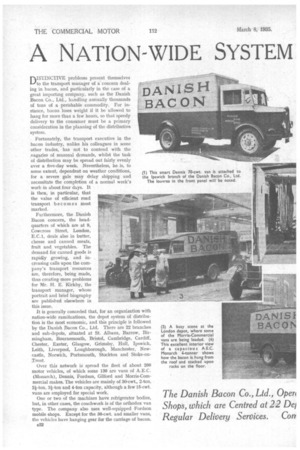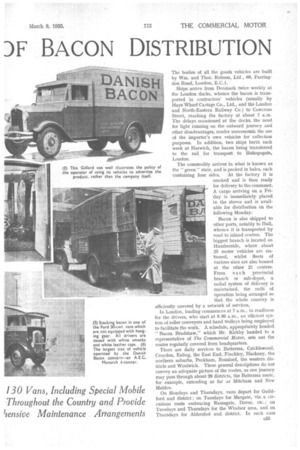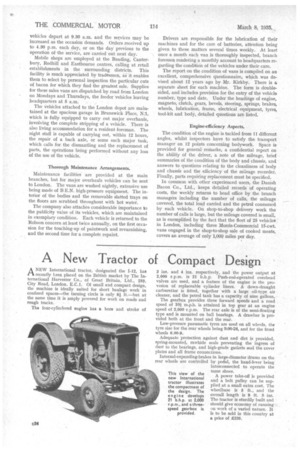A NATION-WIDE SYSTEM
Page 54

Page 55

Page 56

If you've noticed an error in this article please click here to report it so we can fix it.
DF BACON DISTRIBUTION DISTINCTIVE problems present themselves to the transport manager of aconcern dealing in bacon, and particularly in the case of a great importing company, such as the Danish Bacon Co., Ltd., handling annually thousands of tons of a perishable commodity. For instance, bacon loses weight if it be allowed to hang for more than a few hours, so that speedy delivery to the consumer must be a primary consideration in the planning of the distributive system.
Fortunately, the transport executive in the bacon industry, unlike his colleagues in some other trades, has not to contend with the vagaries of seasonal demands, whilst the task of distribution may be spread out fairly evenly over a five-day week. Nevertheless, he is, to some extent, dependent on weather conditions, for a severe gale may delay shipping and necessitate the completion of a normal week's work in about four days. It is then, in particular, that the value of efficient road transport becomes most marked.
Furthermore, the Danish Bacon concern, the headquarters of which are at 9, Cowcross Street, London, E.C.1, deals also in butter, cheese and canned meats, fruit and vegetables. The demand for canned goods is rapidly growing, and increasing calls upon the company's transport 'resources are, therefore, being made, thus creating more problems for Mr. H. E. Kirkby, the transport manager, whose portrait and brief biography are published elsewhere in this issue.
It is generally conceded that, for an organization with nation-wide ramifications, the depot system of distribution is the most economic, and this principle is followed by the Danish Bacon Co., Ltd. There are 22 branches and sub-depots, situated at St. Albans, Barrow, Birmingham, Bournemouth, Bristol, Cambridge, Cardiff, Chester, Exeter, Glasgow, Grimsby, Hull, Ipswich, Leith, Liverpool, Loughborough, Manchester, Newcastle, Norwich, Portsmouth, Stockton and Stoke-onTrent.
Over this network is spread the fleet of about 200 motor vehicles, of which some 130 are vans of A.E.C. (Monarch), Dennis, Fordson, Gilford and Morris-Commercial makes. The vehicles are mainly of 30-cwt., 2-ton, 2i-ton, 3i-ton and 4-ton capacity, although a few 15-cwt. vans are employed for special work.
One or two of the machines have refrigerator bodies, but,, in other cases, the coachwork is of the orthodox van type. The company also uses well-equipped Fordson mobile shops. Except for the 30-cwt. and smaller vans, the vehicles have hanging gear for the carriage of bacon.
e32
The bodies of all the goods vehicles are .built by Wm. and Thos. Robson, Ltd., 60, Fairingdon Road, London, E.C.1.
Ships arrive from Denmark twice weekly at the London docks, whence the bacon is transported in contractors' vehicles (usually by Hays Wharf Cartage Co., Ltd., and the London and North-Eastern Railway Co.) to Cowcross Street, reaching the factory at about 7 a.m. The delays occasioned at the docks, the need for light running on the outward journey and other disadvantages, render uneconomic the use of the importer's own vehicles for collection purposes. In addition, two ships berth each week at Harwich, the bacon being transferred to the rail for transport to Bishopsgate, London, The commodity arrives in what is known as the " green " state, and is packed in bales, each containing four sides. At the factory it is smoked and is then ready for delivery to the consumer. A cargo arriving on a Friday is immediately placed in the stoves aud is available for distribution on the following Monday.
Bacon is also shipped to other ports, notably to Hull, whence it is transported by road to inland centres. The biggest branch is located on Humberside, where about 25 motor vehicles are sta-tinned, whilst fleets of various sizes are also housed at the other 21 centres. From each provincial branch or sub-depot, a radial system of delivery is maintained, the radii of operation being arranged so that the whole country is efficiently covered by a network of services.
In London, loading commences at 7 a.m., in readiness for the drivers, who start at 8.30 a.m., an efficient systern of roller conveyers and hand trolleys being employed to facilitate the work. A schedule, appropriately headed "Bacon Bradshaw," which Mr. Kirkby handed to a representative of The Commercial Motor, sets out the routes regularly covered from headquarters.
There are daily services to Battersea, Cricldewood, Croydon, Ealing, the East End, Finchley, Hackney, the northern suburbs, Peckham, Rornford, the western districts and Woolwich. These general descriptions do not convey an adequate picture of the routes, as one journey may pass through about 20 districts, the Battersea route, for example, extending as far as Mitcham and New Malden.
On Mondays and Thursdays, vans depart for Guildford and district ; on Tuesdays for Margate, via a circuitous route embracing Ramsgate, Dover, etc.; on Tuesdays and Thursdays for the Windsor area, and on Thursdays for Aldershot and district. In each case vehicles depart at 9.30 a.m. and the services may be increased as the occasion demands. Orders received up to 4.30 p.m. each day, or on the day previous to the operation of the service, are carried out next day.
Mobile shops are employed at the Reading, Canterbury, Redhill and Eastbourne centres, calling at retail establishments in the surrounding districts. This facility is much appreciated by tradesmen, ai it enables them to select by personal inspection the particular cuts of bacon for which they find the greatest sale. Supplies for these sales vans are dispatched by road from London on Mondays and Thursdays, the feeder vehicles leaving headquarters at 5 a.m.
The vehicles attached to the London depot are maintained at the spacious garage in Brunswick Place, Ni. which is• fully equipped to carry out major overhauls, involving the complete stripping of a vehicle. There is also living accommodation for a resident foreman. The night staff is capable of carrying out, within 12 hours, the repair of a back axle, or some such major task, which calls for the dismantling and the replacement of parts, the operations being performed without any loss of the use of the vehicle.
Thorough Maintenance Arrangements.
Maintenance facilities are provided at the main branches, but for major overhauls vehicles can be sent to London. The vans are washed nightly, extensive use being made of BEN. high-pressure equipment. The interior of the bodies and the removable slatted trays on the floors are scrubbed throughout with hot water.
The company also attaches considerable importance to the publicity value of its vehicles, which are maintained in exemplary condition. Each vehicle is returned to the Robson concern at least twice annually, on the first occasion for the touching-up of paintwork and revarnishing, and the second time for a complete repaint. Drivers are responsible for the lubrication of their machines and for the care of batteries, attention being given to these matters several times weekly. At least once a month each van is thoroughly inspected, branch foremen rendering a monthly account to headquarters regarding the conditicin of the vehicles under their care.
The report on the condition of vans is compiled on an excellent, comprehensive questionnaire, which was devised about 12 years ago by Mr. Kirkby. There is a separate sheet for each machine. The form is doublesided, and includes provision for the entry of the vehicle number, type and date. Under the headings of engine, magneto, clutch, gears, bevels, steering, springs, brakes, wheels, lubrication, frame, electrical equipment, tyres, tool-kit and body, detailed questions are listed.
Engine-efficiency Aspects.
The condition of the engine is tackled from 11 different angles, whilst inspectors have to satisfy the transport manager on 12 points concerning bodywork. Space is provided for general remarks, a confidential report on the ability of the driver, a note of the mileage, brief summaries of the condition of the body and chassis, and answers to questions relating to the cleanliness of body and chassis and the efficiency of the mileage recorder. Finally, parts requiring replacement must be specified.
In common with other experienced users, the Danish Bacon Co., Ltd., keeps detailed records of operating costs, the weekly returns to head office by the branch managers including the number of calls, the mileage covered, the total load carried and the petrol consumed by each vehicle. On shop-to-shop delivery work the number of calls is large, but the mileage covered is small, as is exemplified by the fact that the fleet of 25 vehicles in London, including three Morris-Commercial 15-cwt. vans engaged in the shop-to-shop sale of cooked meats, covers an average of only 1,000 miles per day.














































































































